Burt A. The Evolution of the British Empire and Commonwealth From the American Revolution
Подождите немного. Документ загружается.

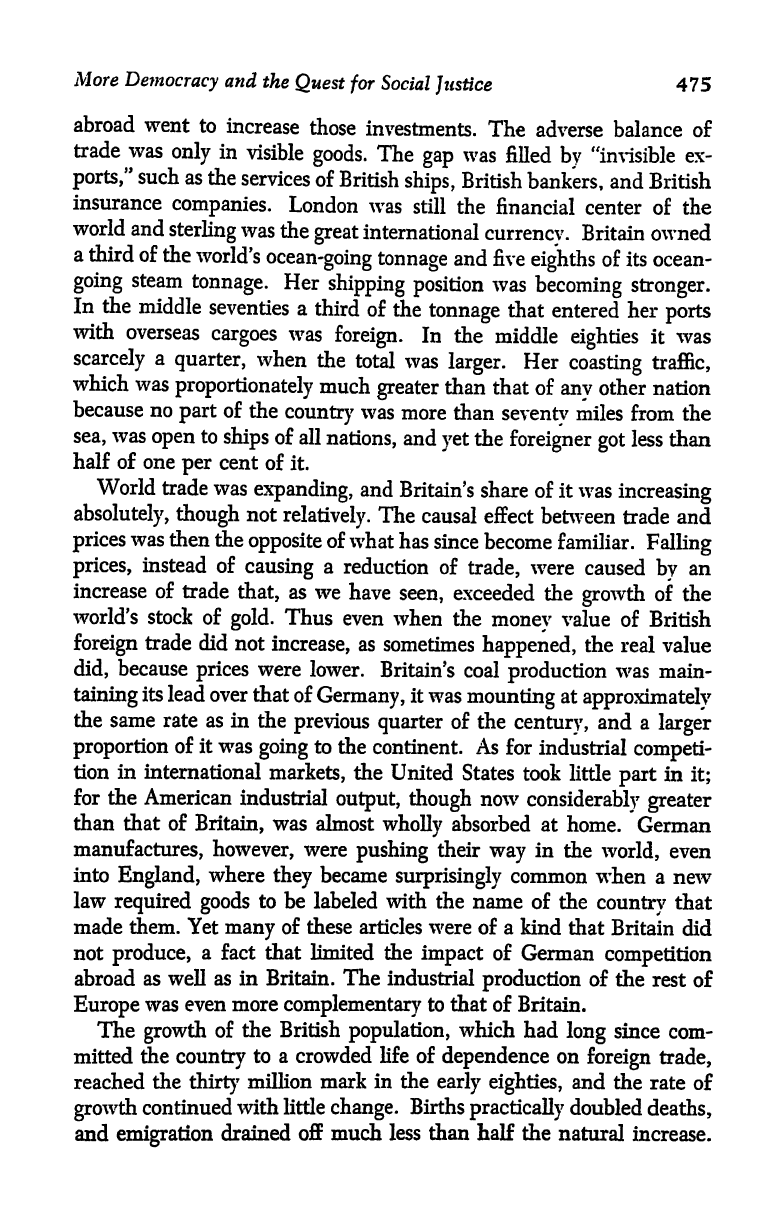
More
Democracy
and
the
Quest
for
Social
Justice
475
abroad
went
to
increase
those
investments.
The
adverse balance of
trade
was
only
in
visible
goods.
The
gap
was
filled
by
"invisible
ex-
ports,"
such
as
the
services
of
British
ships,
British
bankers,
and
British
insurance
companies.
London
was
still
the
financial
center
of
the
world
and
sterling
was
the
great
international
currency.
Britain
owned
a
third of
the
world's
ocean-going
tonnage
and five
eighths
of
its ocean-
going
steam
tonnage.
Her
shipping position
was
becoming stronger.
In
the
middle
seventies a
third
of
the
tonnage
that
entered her
ports
with
overseas
cargoes
was
foreign.
In
the
middle
eighties
it
was
scarcely
a
quarter,
when
the
total was
larger.
Her
coasting
traffic,
which was
proportionately
much
greater
than that
of
any
other nation
because no
part
of
the
country
was
more than
seventy
miles
from the
sea,
was
open
to
ships
of
all
nations,
and
yet
the
foreigner got
less than
half of
one
per
cent
of it.
World
trade
was
expanding,
and
Britain's
share
of
it
was
increasing
absolutely,
though
not
relatively.
The
causal
effect between
trade and
prices
was
then the
opposite
of
what
has
since
become
familiar.
Falling
prices,
instead of
causing
a
reduction of
trade,
were
caused
by
an
increase of
trade
that,
as
we
have
seen,
exceeded the
growth
of the
world's
stock
of
gold.
Thus
even
when
the
money
value of
British
foreign
trade
did not
increase,
as
sometimes
happened,
the
real value
did,
because
prices
were
lower.
Britain's
coal
production
was
main-
taining
its
lead over
that
of
Germany,
it
was
mounting
at
approximately
the same rate as
in the
previous
quarter
of the
century,
and a
larger
proportion
of
it
was
going
to the
continent. As
for
industrial
competi-
tion in
international
markets,
the
United States
took
little
part
in
it;
for
the American
industrial
output,
though
now
considerably
greater
than that
of
Britain,
was
almost
wholly
absorbed at
home.
German
manufactures, however,
were
pushing
their
way
in
the
world,
even
into
England,
where
they
became
surprisingly
common
when a
new
law
required
goods
to be labeled with the
name
of the
country
that
made
them.
Yet
many
of
these
articles were of a
kind
that
Britain
did
not
produce,
a
fact
that
limited
the
impact
of
German
competition
abroad
as
well
as in Britain. The
industrial
production
of
the
rest
of
Europe
was even
more
complementary
to that
of
Britain.
The
growth
of
the
British
population,
which
had
long
since
com-
mitted
the
country
to
a
crowded life of
dependence
on
foreign
trade,
reached
the
thirty
million
mark in the
early
eighties,
and
the
rate
of
growth
continued
with
little
change.
Births
practically
doubled
deaths,
and
emigration
drained
off
much less
than
half the
natural
increase.
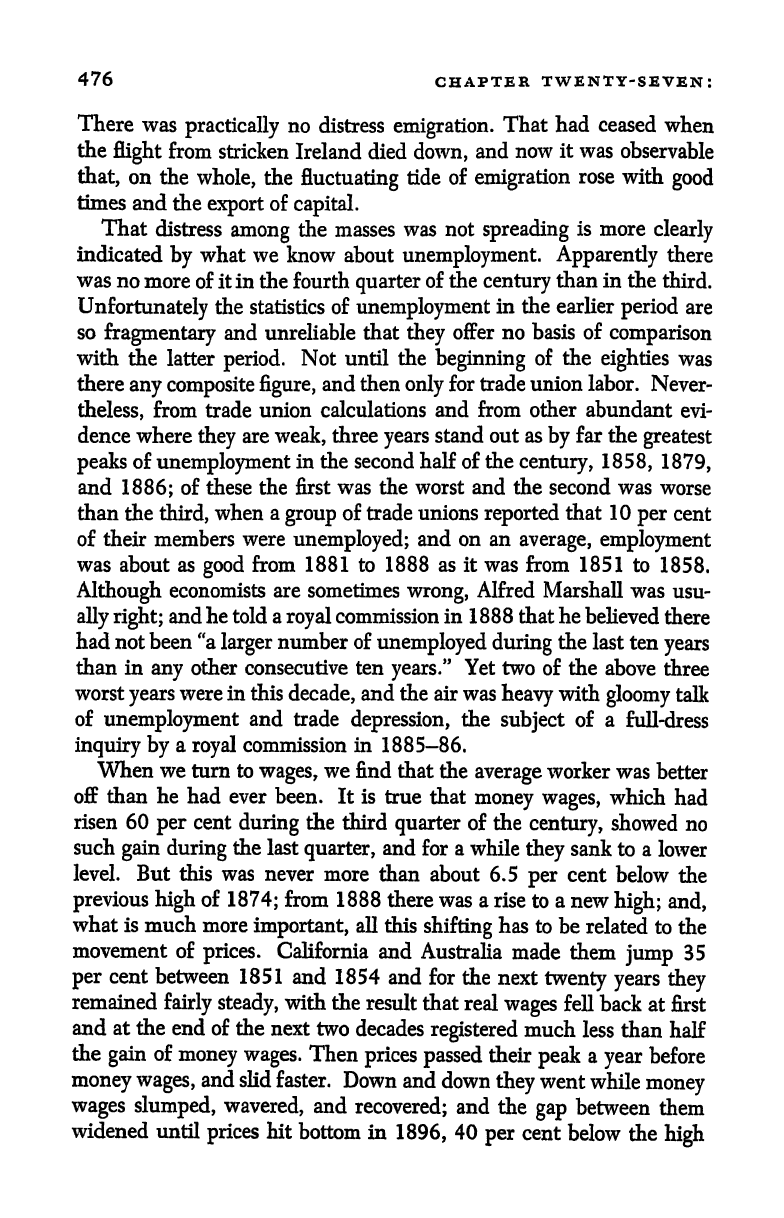
476
CHAPTER
TWENTY-SEVEN:
There
was
practically
no distress
emigration.
That had ceased
when
the
flight
from stricken
Ireland died
down,
and
now
it
was
observable
that,
on
the
whole,
the
fluctuating
tide
of
emigration
rose with
good
times and
the
export
of
capital.
That
distress
among
the masses
was not
spreading
is more
clearly
indicated
by
what we
know about
unemployment. Apparently
there
was
no more
of it
in the fourth
quarter
of die
century
than
in
the
third.
Unfortunately
the
statistics of
unemployment
in the earlier
period
are
so
fragmentary
and unreliable
that
they
offer
no
basis of
comparison
with
the
latter
period.
Not until
the
beginning
of the
eighties
was
there
any composite figure,
and
then
only
for
trade union labor.
Never-
theless,
from trade union
calculations
and
from
other
abundant
evi-
dence where
they
are
weak,
three
years
stand out as
by
far
the
greatest
peaks
of
unemployment
in
the
second half of
the
century,
1858,
1879,
and
1886;
of
these the first
was the
worst
and
the
second
was
worse
than
the
third,
when
a
group
of trade
unions
reported
that
10
per
cent
of their members
were
unemployed;
and on an
average, employment
was
about
as
good
from
1881
to
1888 as it
was from 1851
to
1858.
Although
economists
are
sometimes
wrong,
Alfred
Marshall was
usu-
ally
right;
and
he told a
royal
commission
in 1888
that
he
believed
there
had
not
been "a
larger
number of
unemployed
during
the
last ten
years
than in
any
other consecutive
ten
years."
Yet two
of
the
above
three
worst
years
were in this
decade,
and the air
was
heavy
with
gloomy
talk
of
unemployment
and
trade
depression,
the
subject
of
a
full-dress
inquiry by
a
royal
commission in
1885-86.
When we
turn to
wages,
we
find that
the
average
worker
was
better
off than he
had ever been. It is
true
that
money
wages,
which
had
risen
60
per
cent
during
the third
quarter
of
the
century,
showed
no
such
gain during
the
last
quarter,
and
for
a
while
they
sank
to a
lower
level.
But
this
was
never
more than
about 6.5
per
cent
below
the
previous high
of
1874;
from 1888 there
was a
rise
to
a
new
high;
and,
what is much
more
important,
all
this
shifting
has
to be
related
to
the
movement of
prices.
California
and
Australia
made them
jump
35
per
cent between
1851
and 1854 and
for
the
next
twenty years
they
remained
fairly
steady,
with the
result that
real
wages
fell back
at
first
and
at the
end of
the next
two decades
registered
much
less than
half
the
gain
of
money
wages.
Then
prices
passed
their
peak
a
year
before
money
wages,
and
slid faster.
Down
and
down
they
went
while
money
wages
slumped,
wavered,
and
recovered;
and
the
gap
between them
widened until
prices
hit
bottom
in
1896,
40
per
cent
below
the
high
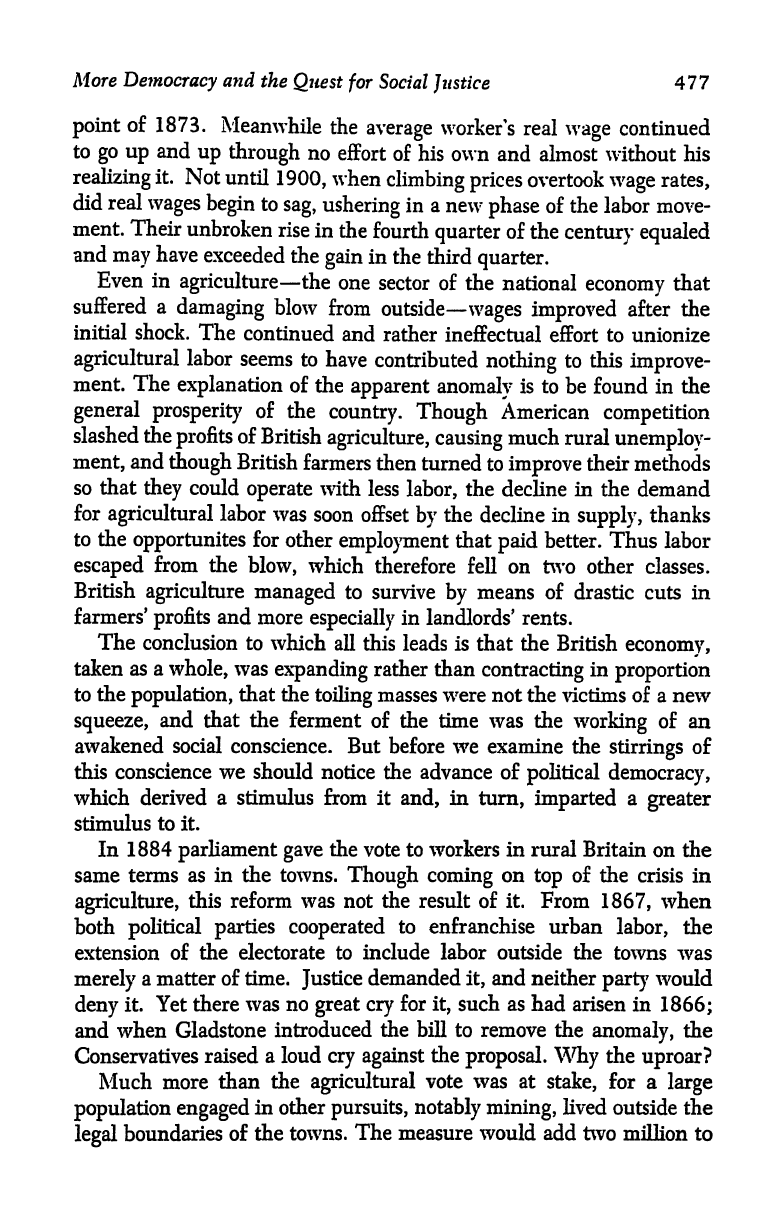
More
Democracy
and
the
Quest
for
Social
Justice
477
point
of
1873.
Meanwhile
the
average
worker's
real
wage
continued
to
go
up
and
up
through
no
effort
of his own
and
almost
without
his
realizing
it.
Not
until
1900,
when
climbing
prices
overtook
wage
rates,
did
real
wages
begin
to
sag,
ushering
in
a
new
phase
of
the
labor
move-
ment. Their
unbroken
rise
in
the
fourth
quarter
of the
century equaled
and
may
have
exceeded
the
gain
in
the third
quarter.
Even
in
agriculture
the
one
sector
of
the
national
economy
that
suffered
a
damaging
blow
from
outside
wages
improved
after
the
initial
shock.
The
continued and
rather
ineffectual effort to unionize
agricultural
labor
seems
to
have
contributed
nothing
to
this
improve-
ment.
The
explanation
of
the
apparent
anomaly
is
to
be
found in
the
general prosperity
of the
country.
Though
American
competition
slashed the
profits
of
British
agriculture,
causing
much
rural
unemploy-
ment,
and
though
British
farmers
then
turned
to
improve
their
methods
so
that
they
could
operate
with
less
labor,
the
decline in the
demand
for
agricultural
labor
was
soon
offset
by
the
decline in
supply,
thanks
to
the
opportunites
for
other
employment
that
paid
better.
Thus labor
escaped
from
the
blow,
which
therefore fell on
two
other
classes.
British
agriculture
managed
to survive
by
means of drastic cuts in
farmers'
profits
and more
especially
in
landlords' rents.
The
conclusion
to which
all this
leads is that the
British
economy,
taken
as a
whole,
was
expanding
rather
than
contracting
in
proportion
to
the
population,
that
the
toiling
masses were not the
victims of a new
squeeze,
and
that
the
ferment
of the time was the
working
of
an
awakened social
conscience-
But
before we examine the
stirrings
of
this conscience
we
should notice the
advance of
political democracy,
which derived
a stimulus from
it
and,
in
turn,
imparted
a
greater
stimulus
to it.
In
1884
parliament gave
the vote to workers in
rural Britain
on the
same
terms as
in the towns.
Though
coming
on
top
of the
crisis in
agriculture,
this
reform
was
not
the result
of
it.
From
1867,
when
both
political
parties cooperated
to enfranchise
urban
labor,
the
extension of
the electorate to include labor outside the
towns was
merely
a
matter of
time.
Justice
demanded
it,
and neither
party
would
deny
it. Yet
there was
no
great
cry
for
it,
such as
had arisen in
1866;
and when Gladstone
introduced
the
bill to remove
the
anomaly,
the
Conservatives
raised
a
loud
cry
against
the
proposal.
Why
the
uproar?
Much
more
than the
agricultural
vote was at
stake,
for a
large
population engaged
in other
pursuits, notably
mining,
lived
outside
the
legal
boundaries
of
the
towns.
The
measure would add
two
million
to
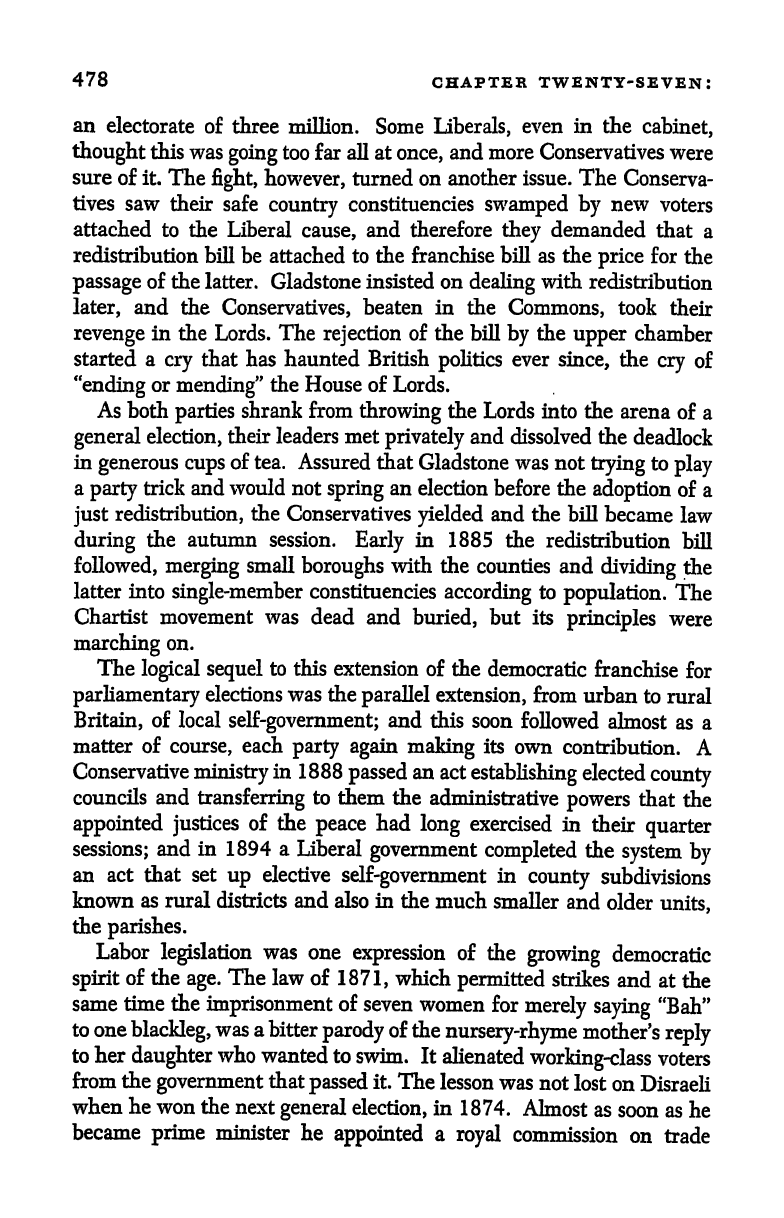
478
CHAPTER
TWENTY-SEVEN:
an
electorate
of three
million.
Some
Liberals,
even in the
cabinet,
thought
this
was
going
too
far all
at
once,
and
more
Conservatives
were
sure
of it.
The
fight,
however,
turned
on
another
issue.
The
Conserva-
tives saw
their
safe
country
constituencies
swamped by
new
voters
attached
to the
Liberal
cause,
and therefore
they
demanded
that
a
redistribution
bill be attached to
the franchise
bill as
the
price
for
the
passage
of the
latter.
Gladstone
insisted
on
dealing
with
redistribution
later,
and
the
Conservatives,
beaten
in
the
Commons,
took
their
revenge
in the
Lords.
The
rejection
of the
bill
by
the
upper
chamber
started
a
cry
that has
haunted
British
politics
ever
since,
the
cry
of
"ending
or
mending"
the
House of Lords.
As both
parties
shrank from
throwing
the Lords into
the
arena
of a
general
election,
their
leaders met
privately
and
dissolved
the
deadlock
in
generous
cups
of
tea.
Assured
that
Gladstone
was
not
trying
to
play
a
party
trick
and
would
not
spring
an election
before the
adoption
of
a
just
redistribution,
the
Conservatives
yielded
and
the
bill
became
law
during
the
autumn
session.
Early
in
1885 the
redistribution
bill
followed,
merging
small
boroughs
with
the
counties
and
dividing
the
latter into
single-member
constituencies
according
to
population.
The
Chartist
movement
was
dead
and
buried,
but
its
principles
were
marching
on.
The
logical
sequel
to
this extension
of
the
democratic
franchise
for
parliamentary
elections was the
parallel
extension,
from
urban
to
rural
Britain,
of
local
self-government;
and this
soon
followed
almost
as
a
matter of
course,
each
party
again making
its
own
contribution.
A
Conservative
ministry
in
1888
passed
an act
establishing
elected
county
councils and
transferring
to
them
the
administrative
powers
that
the
appointed
justices
of
the
peace
had
long
exercised in
their
quarter
sessions;
and
in
1894 a
Liberal
government
completed
the
system
by
an
act
that
set
up
elective
self-government
in
county
subdivisions
known
as
rural districts and
also in the
much
smaller
and
older
units,
the
parishes.
Labor
legislation
was
one
expression
of
the
growing
democratic
spirit
of the
age.
The law
of
1871,
which
permitted
strikes
and at
the
same
time the
imprisonment
of seven
women
for
merely
saying
"Bah"
to one
blackleg,
was a
bitter
parody
of the
nursery-rhyme
mother's
reply
to her
daughter
who
wanted
to
swim.
It
alienated
working-class
voters
from
the
government
that
passed
it.
The
lesson
was
not
lost
on
Disraeli
when
he
won the
next
general
election,
in
1874.
Almost
as
soon as
he
became
prime
minister
he
appointed
a
royal
commission
on
trade
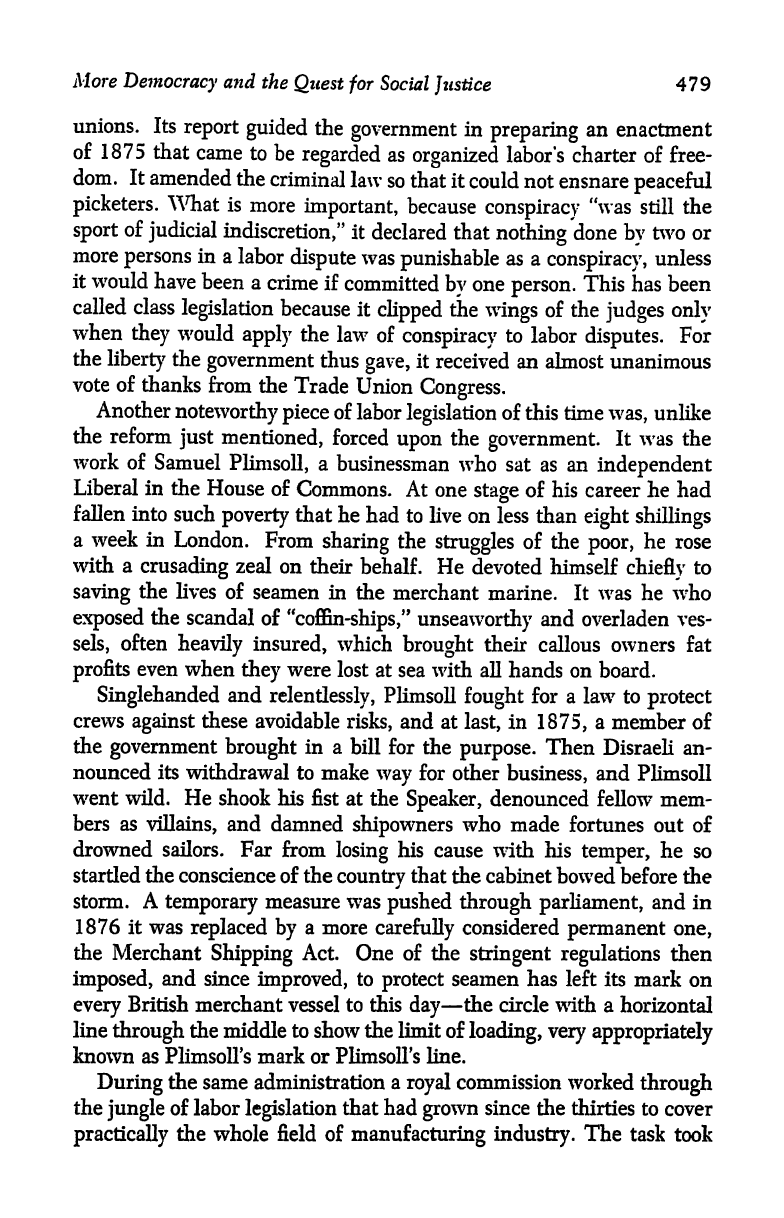
More
Democracy
and
the
Quest
for
Social
Justice
479
unions. Its
report
guided
the
government
in
preparing
an
enactment
of
1875
that
came
to be
regarded
as
organized
labors charter
of
free-
dom.
It
amended
the
criminal law
so that it
could not ensnare
peaceful
picketers.
What
is
more
important,
because
conspiracy
"was
still
the
sport
of
judicial
indiscretion/'
it
declared that
nothing
done
by
two or
more
persons
in
a
labor
dispute
was
punishable
as a
conspiracy,
unless
it would
have
been a
crime if
committed
by
one
person.
This
has
been
called
class
legislation
because
it
clipped
the
wings
of the
judges
only
when
they
would
apply
the
law
of
conspiracy
to
labor
disputes.
For
the
liberty
the
government
thus
gave,
it
received an almost
unanimous
vote of
thanks
from the
Trade
Union
Congress.
Another
noteworthy piece
of
labor
legislation
of this time
was,
unlike
the
reform
just
mentioned,
forced
upon
the
government.
It
was the
work
of
Samuel
Plimsoll,
a
businessman
who sat as an
independent
Liberal in
the
House
of
Commons. At
one
stage
of his career
he
had
fallen
into
such
poverty
that
he
had
to live
on less than
eight
shillings
a
week
in
London.
From
sharing
the
struggles
of
the
poor,
he rose
with a
crusading
zeal
on
their
behalf. He
devoted himself
chiefly
to
saving
the
lives of
seamen in
the
merchant marine. It
was he
who
exposed
the
scandal of
"coffin-ships,"
unseaworthy
and overladen ves-
sels,
often
heavily
insured,
which
brought
their
callous
owners fat
profits
even
when
they
were lost at sea with
all
hands
on
board.
Singlehanded
and
relentlessly,
Plimsoll
fought
for a
law to
protect
crews
against
these
avoidable
risks,
and
at
last,
in
1875,
a
member
of
the
government
brought
in a
bill
for
the
purpose.
Then Disraeli an-
nounced its
withdrawal
to
make
way
for
other
business,
and Plimsoll
went wild. He
shook his fist at
the
Speaker,
denounced
fellow
mem-
bers as
villains,
and
damned
shipowners
who made
fortunes out
of
drowned sailors.
Far
from
losing
his cause with
his
temper,
he
so
startled the
conscience
of
the
country
that
the
cabinet
bowed
before the
storm.
A
temporary
measure was
pushed
through parliament,
and
in
1876 it was
replaced by
a
more
carefully
considered
permanent
one,
the
Merchant
Shipping
Act.
One
of the
stringent regulations
then
imposed,
and since
improved,
to
protect
seamen has left
its
mark
on
every
British merchant vessel
to this
day
the
circle with
a
horizontal
line
through
the middle to show
the
limit of
loading, very
appropriately
known as
Plimsoll's
mark
or Plimsoll's
line.
During
the same
administration
a
royal
commission
worked
through
the
jungle
of labor
legislation
that had
grown
since
the
thirties
to
cover
practically
the
whole field
of
manufacturing industry.
The
task
took
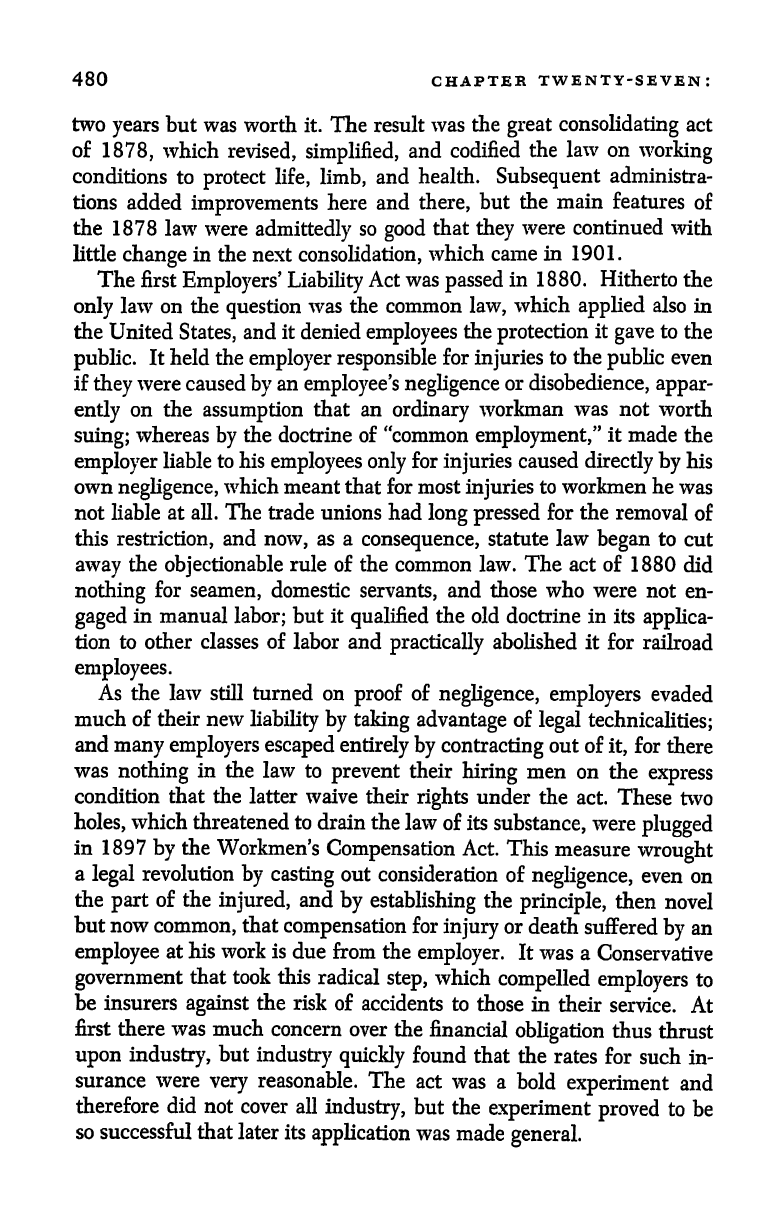
480
CHAPTER
TWENTY-SEVEN:
two
years
but was worth it. The result
was
the
great consolidating
act
of
1878,
which
revised,
simplified,
and
codified
the law
on
working
conditions
to
protect
life,
limb,
and
health.
Subsequent
administra-
tions
added
improvements
here
and
there,
but
the
main
features
of
the
1878 law
were
admittedly
so
good
that
they
were
continued
with
little
change
in the next
consolidation,
which came
in
1901.
The
first
Employers'
Liability
Act
was
passed
in
1880. Hitherto
the
only
law on the
question
was the
common
law,
which
applied
also in
the
United
States,
and
it
denied
employees
the
protection
it
gave
to
the
public.
It held
the
employer responsible
for
injuries
to
the
public
even
if
they
were caused
by
an
employee's
negligence
or
disobedience,
appar-
ently
on the
assumption
that an
ordinary
workman
was
not
worth
suing;
whereas
by
the doctrine of "common
employment,"
it
made
the
employer
liable
to his
employees only
for
injuries
caused
directly
by
his
own
negligence,
which
meant
that
for most
injuries
to
workmen
he
was
not liable at
all. The
trade unions had
long pressed
for
the
removal
of
this
restriction,
and
now,
as
a
consequence,
statute law
began
to
cut
away
the
objectionable
rule of the common law. The act of 1880
did
nothing
for
seamen,
domestic
servants,
and those who were
not
en-
gaged
in
manual
labor;
but
it
qualified
the old doctrine in
its
applica-
tion to other classes
of
labor and
practically
abolished it
for
railroad
employees.
As
the law still turned
on
proof
of
negligence, employers
evaded
much of their new
liability
by
taking
advantage
of
legal
technicalities;
and
many employers escaped
entirely by
contracting
out
of
it,
for
there
was
nothing
in
the law
to
prevent
their
hiring
men
on the
express
condition
that the
latter
waive
their
rights
under
the
act.
These
two
holes,
which
threatened
to
drain
the law
of its
substance,
were
plugged
in 1897
by
the
Workmen's
Compensation
Act.
This
measure
wrought
a
legal
revolution
by
casting
out
consideration
of
negligence,
even
on
the
part
of the
injured,
and
by
establishing
the
principle,
then
novel
but
now
common,
that
compensation
for
injury
or
death
suffered
by
an
employee
at his work is
due
from the
employer.
It
was a
Conservative
government
that took this
radical
step,
which
compelled
employers
to
be insurers
against
the risk
of
accidents
to
those
in
their
service.
At
first
there was
much concern
over the
financial
obligation
thus
thrust
upon
industry,
but
industry
quickly
found
that the
rates
for
such
in-
surance
were
very
reasonable.
The
act
was
a
bold
experiment
and
therefore
did
not cover
all
industry,
but
the
experiment
proved
to be
so
successful
that
later
its
application
was
made
general.
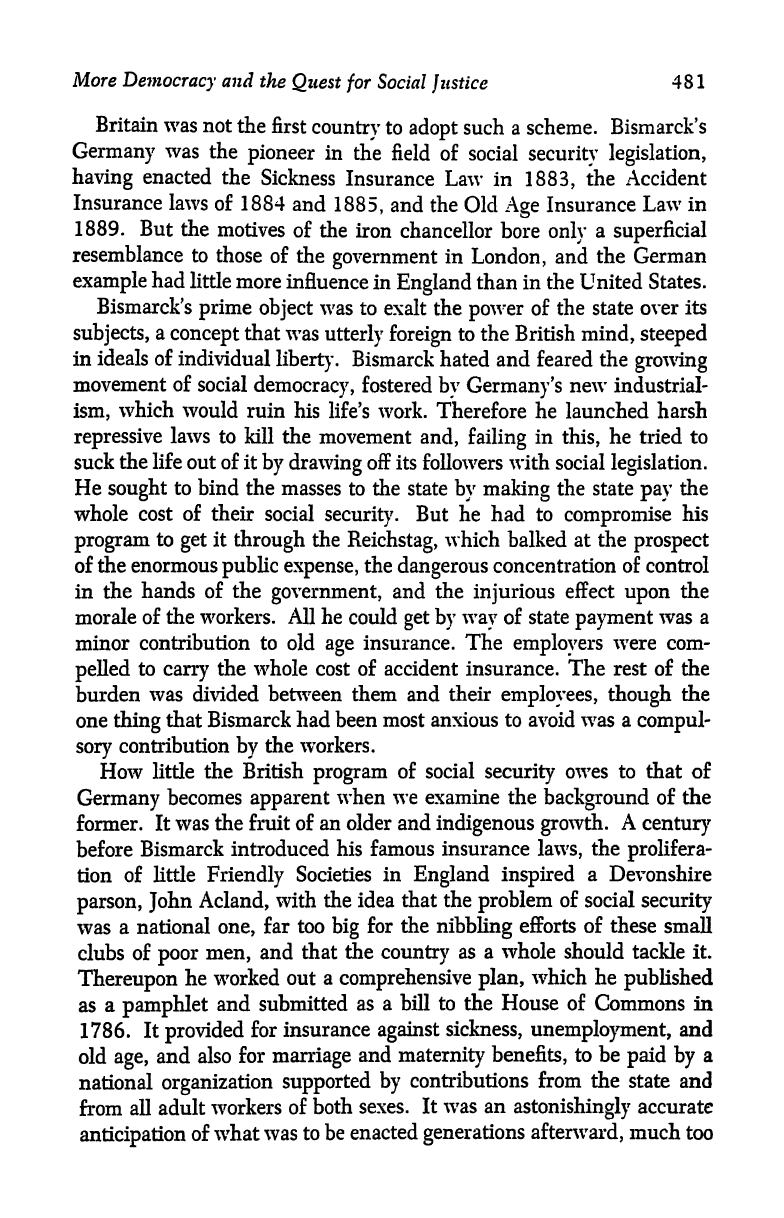
More
Democracy
and
the
Quest
for
Social
Justice
481
Britain
was not
the
first
country
to
adopt
such a
scheme.
Bismarck's
Germany
was
the
pioneer
in
the
field of
social
security legislation,
having
enacted
the
Sickness
Insurance Law
in
1883,
the
Accident
Insurance
laws
of
1884
and
1885,
and the
Old
Age
Insurance
Law in
1889.
But
the
motives
of the
iron
chancellor
bore
only
a
superficial
resemblance to
those
of the
government
in
London,
and
the German
example
had little
more
influence
in
England
than
in the United
States.
Bismarck's
prime
object
was to
exalt the
power
of
the state
over
its
subjects,
a
concept
that
was
utterly
foreign
to
the British
mind,
steeped
in
ideals of
individual
liberty.
Bismarck hated
and
feared the
growing
movement
of
social
democracy,
fostered
by
Germany's
new
industrial-
ism,
which
would ruin
his
life's
work.
Therefore he
launched
harsh
repressive
laws
to
kill the
movement
and,
failing
in
this,
he
tried
to
suck
the life
out
of it
by
drawing
off its
followers
with
social
legislation.
He
sought
to
bind
the
masses to the state
by
making
the state
pay
the
whole
cost of their
social
security.
But
he
had
to
compromise
his
program
to
get
it
through
the
Reichstag,
which balked
at the
prospect
of
the enormous
public expense,
the
dangerous
concentration
of
control
in the
hands
of the
government,
and
the
injurious
effect
upon
the
morale
of
the
workers.
All
he
could
get
by
way
of
state
payment
was
a
minor
contribution
to
old
age
insurance.
The
employers
were com-
pelled
to
carry
the whole cost of accident insurance. The
rest
of the
burden
was divided
between them
and
their
employees,
though
the
one
thing
that
Bismarck had been most anxious to avoid was a
compul-
sory
contribution
by
the workers.
How little
the British
program
of social
security
owes to that of
Germany
becomes
apparent
when
we examine the
background
of
the
former.
It
was the fruit of
an
older
and
indigenous growth.
A
century
before
Bismarck
introduced his
famous
insurance
laws,
the
prolifera-
tion of little
Friendly
Societies
in
England inspired
a
Devonshire
parson,
John
Acland,
with the idea
that the
problem
of
social
security
was
a
national
one,
far too
big
for the
nibbling
efforts of these
small
clubs
of
poor
men,
and
that
die
country
as
a whole
should tackle
it.
Thereupon
he
worked out
a
comprehensive
plan,
which he
published
as
a
pamphlet
and submitted
as
a bill to the House of
Commons in
1786.
It
provided
for
insurance
against
sickness,
unemployment,
and
old
age,
and
also
for
marriage
and
maternity
benefits,
to be
paid
by
a
national
organization
supported
by
contributions from the
state and
from
all
adult
workers
of
both
sexes. It
was an
astonishingly
accurate
anticipation
of
what
was
to
be
enacted
generations
afterward,
much
too
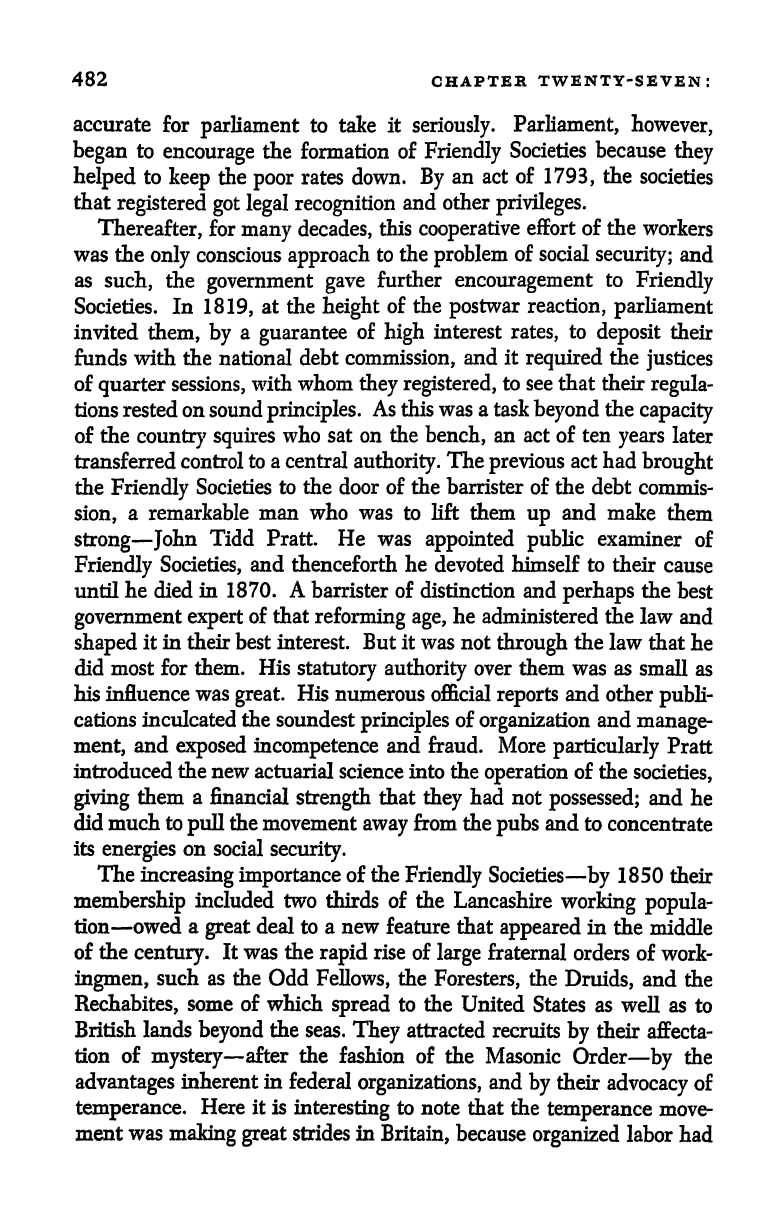
482
CHAPTER TWENTY-SEVEN:
accurate
for
parliament
to take
it
seriously.
Parliament,
however,
began
to
encourage
the formation of
Friendly
Societies because
they
helped
to
keep
the
poor
rates
down.
By
an act
of
1793,
the
societies
that
registered
got
legal
recognition
and
other
privileges.
Thereafter,
for
many
decades,
this
cooperative
effort
of
the
workers
was the
only
conscious
approach
to
the
problem
of social
security;
and
as
such,
the
government
gave
further
encouragement
to
Friendly
Societies.
In
1819,
at the
height
of the
postwar
reaction,
parliament
invited
them,
by
a
guarantee
of
high
interest
rates,
to
deposit
their
funds
with the national debt
commission,
and it
required
the
justices
of
quarter
sessions,
with
whom
they
registered,
to see
that
their
regula-
tions rested
on
sound
principles.
As
this was
a
task
beyond
the
capacity
of
the
country squires
who
sat
on the
bench,
an act of ten
years
later
transferred
control
to
a
central
authority.
The
previous
act had
brought
the
Friendly
Societies
to
the door
of
the
barrister
of
the debt
commis-
sion,
a remarkable
man who was
to
lift them
up
and
make
them
strong
John
Tidd
Pratt.
He
was
appointed public
examiner
of
Friendly
Societies,
and thenceforth he
devoted himself
to
their
cause
until
he
died
in 1870.
A
barrister
of
distinction and
perhaps
the
best
government
expert
of that
reforming
age,
he
administered
the
law
and
shaped
it
in their
best interest. But
it
was
not
through
the
law
that
he
did most
for
them.
His
statutory authority
over
them
was as
small as
his
influence
was
great.
His numerous official
reports
and
other
publi-
cations
inculcated the
soundest
principles
of
organization
and
manage-
ment,
and
exposed
incompetence
and fraud.
More
particularly
Pratt
introduced
the new
actuarial
science into the
operation
of
the
societies,
giving
them
a
financial
strength
that
they
had not
possessed;
and
he
did much to
pull
the movement
away
from
the
pubs
and
to
concentrate
its
energies
on
social
security.
The
increasing
importance
of
the
Friendly
Societies
by
1850
their
membership
included
two
thirds of the
Lancashire
working popula-
tion owed
a
great
deal
to
a
new
feature
that
appeared
in
the
middle
of
the
century.
It
was
the
rapid
rise
of
large
fraternal
orders
of work-
ingmen,
such
as the
Odd
Fellows,
the
Foresters,
the
Druids,
and the
Rechabites,
some of which
spread
to
the United
States as
well
as
to
British lands
beyond
the
seas.
They
attracted
recruits
by
their
affecta-
tion
of
mystery
after the
fashion
of the Masonic
Order
by
the
advantages
inherent
in
federal
organizations,
and
by
their
advocacy
of
temperance.
Here it is
interesting
to note
that the
temperance
move-
ment
was
making
great
strides
in
Britain,
because
organized
labor
had
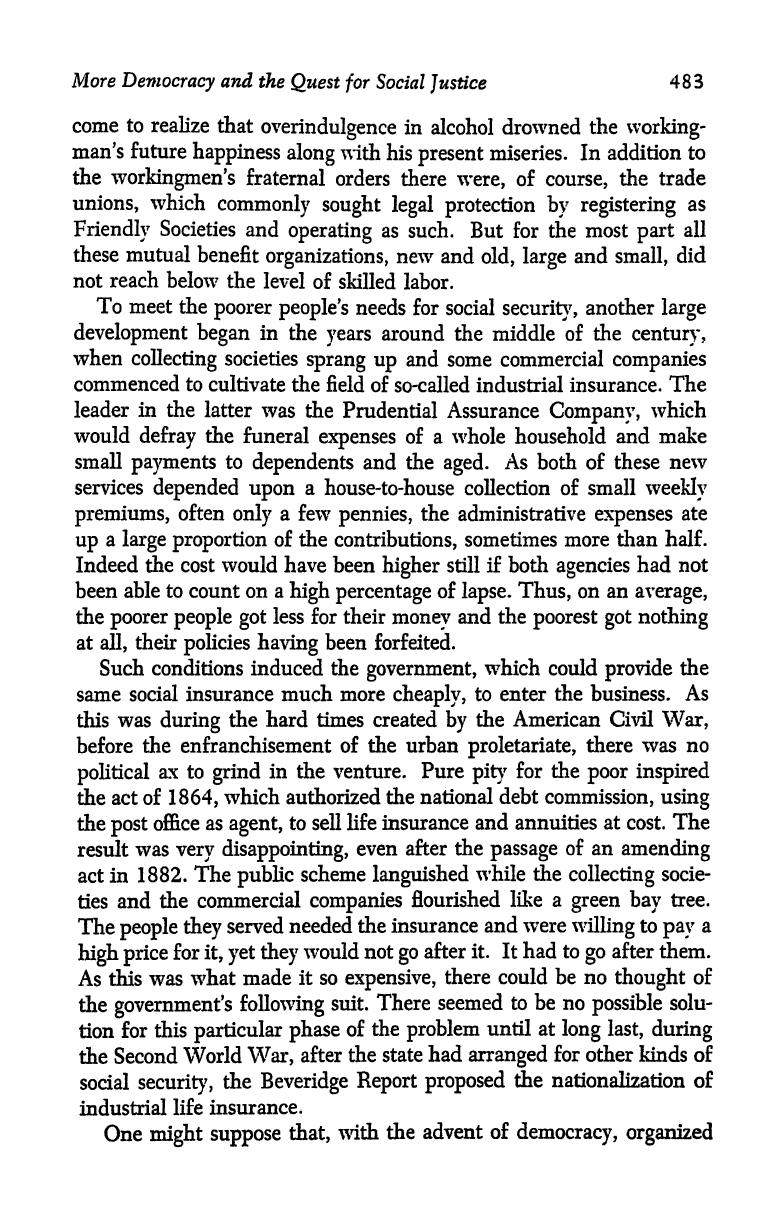
More
Democracy
and
the
Quest
for
Social
Justice
483
come to realize
that
overindulgence
in
alcohol
drowned
the
working-
man's
future
happiness
along
with
his
present
miseries.
In
addition
to
the
workingmen's
fraternal
orders
there
were,
of
course,
the
trade
unions,
which
commonly
sought
legal protection
by registering
as
Friendly
Societies
and
operating
as such. But for the
most
part
all
these
mutual
benefit
organizations,
new
and
old,
large
and
small,
did
not
reach
below the
level
of
skilled
labor.
To
meet
the
poorer
people's
needs for social
security,
another
large
development
began
in
the
years
around the
middle of
the
century,
when
collecting
societies
sprang up
and some commercial
companies
commenced to
cultivate the
field of
so-called industrial
insurance.
The
leader
in the latter
was the
Prudential
Assurance
Company,
which
would
defray
the
funeral
expenses
of a
whole
household and
make
small
payments
to
dependents
and
the
aged.
As
both of
these
new
services
depended upon
a
house-to-house
collection
of
small
weekly
premiums,
often
only
a few
pennies,
the administrative
expenses
ate
up
a
large proportion
of the
contributions,
sometimes more
than
half.
Indeed
the
cost would
have been
higher
still
if
both
agencies
had
not
been
able to
count
on
a
high percentage
of
lapse.
Thus,
on an
average,
the
poorer people got
less
for
their
money
and
the
poorest got nothing
at
all,
their
policies
having
been forfeited.
Such
conditions induced the
government,
which
could
provide
the
same
social
insurance
much
more
cheaply,
to enter
the
business.
As
this
was
during
the hard times created
by
the
American
Civil
War,
before
the enfranchisement
of
the
urban
proletariate,
there
was
no
political
ax to
grind
in the venture.
Pure
pity
for the
poor
inspired
the
act of
1864,
which authorized
the national debt
commission,
using
the
post
office
as
agent,
to
sell
life
insurance
and annuities
at
cost.
The
result
was
very disappointing,
even
after the
passage
of an
amending
act
in
1882.
The
public
scheme
languished
while the
collecting
socie-
ties
and
the
commercial
companies
flourished
like a
green bay
tree.
The
people
they
served
needed
the insurance
and
were
willing
to
pay
a
high
price
for
it,
yet they
would
not
go
after
it.
It
had to
go
after
them.
As
this
was
what
made
it so
expensive,
there
could be no
thought
of
the
government's
following
suit.
There
seemed to be
no
possible
solu-
tion
for
this
particular
phase
of
the
problem
until at
long
last,
during
the Second
World
War,
after the
state
had
arranged
for
other kinds of
social
security,
the
Beveridge
Report
proposed
the
nationalization of
industrial
life
insurance.
One
might
suppose
that,
with
the
advent
of
democracy,
organized
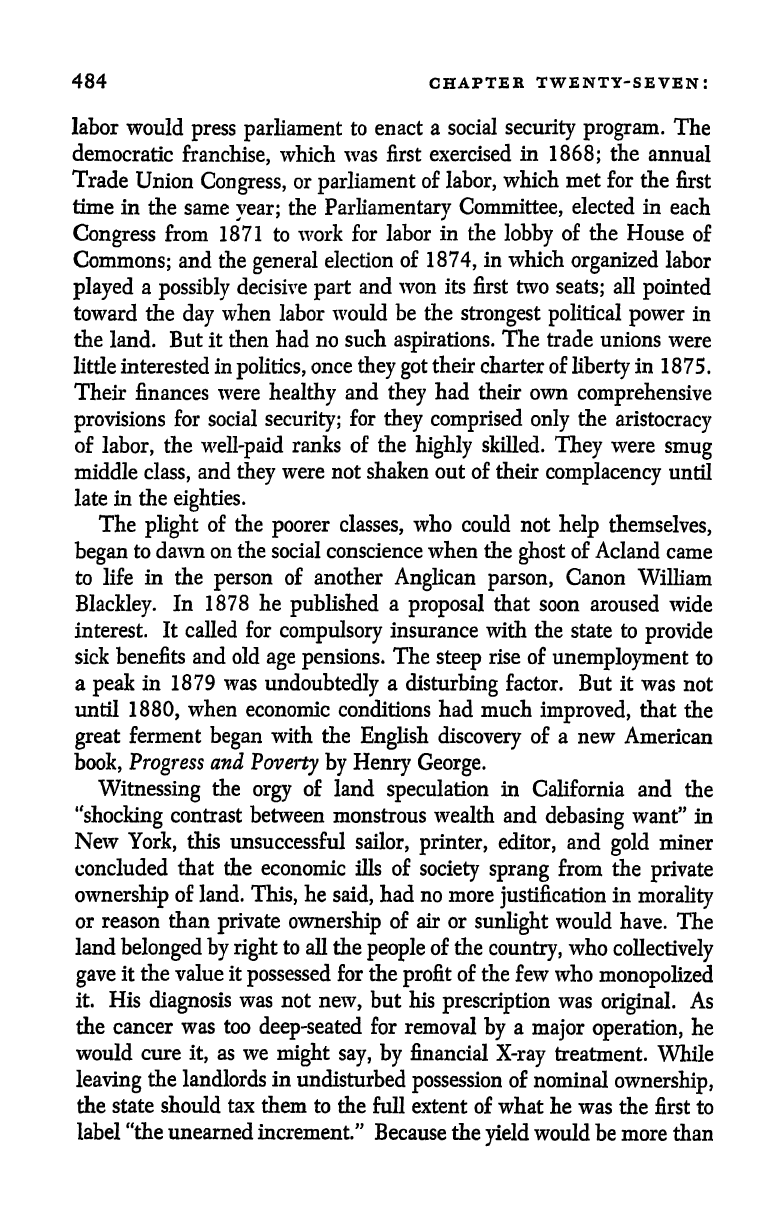
484
CHAPTER TWENTY-SEVEN:
labor
would
press
parliament
to
enact a
social
security
program.
The
democratic
franchise,
which
was
first
exercised
in
1868;
the
annual
Trade
Union
Congress,
or
parliament
of
labor,
which met
for
the
first
time
in the
same
year;
the
Parliamentary
Committee,
elected in
each
Congress
from 1871
to
work for
labor
in the
lobby
of the
House
of
Commons;
and the
general
election
of
1874,
in which
organized
labor
played
a
possibly
decisive
part
and won its first two
seats;
all
pointed
toward
the
day
when
labor would
be the
strongest
political
power
in
the
land.
But it
then had
no
such
aspirations.
The trade
unions
were
little
interested in
politics,
once
they
got
their
charter
of
liberty
in
1875.
Their finances were
healthy
and
they
had
their
own
comprehensive
provisions
for social
security;
for
they comprised
only
the
aristocracy
of
labor,
the
well-paid
ranks
of
the
highly
skilled.
They
were
smug
middle
class,
and
they
were not shaken out
of their
complacency
until
late
in
the
eighties.
The
plight
of
the
poorer
classes,
who
could not
help
themselves,
began
to
dawn
on
the
social conscience when the
ghost
of
Acland
came
to life
in the
person
of
another
Anglican parson,
Canon
William
Blackley.
In
1878 he
published
a
proposal
that soon
aroused
wide
interest.
It called
for
compulsory
insurance
with the state
to
provide
sick
benefits
and old
age
pensions.
The
steep
rise
of
unemployment
to
a
peak
in 1879 was
undoubtedly
a
disturbing
factor. But it
was
not
until
1880,
when
economic conditions
had much
improved,
that
the
great
ferment
began
with the
English discovery
of
a new
American
book,
Progress
and
Poverty
by
Henry
George.
Witnessing
the
orgy
of land
speculation
in
California
and
the
"shocking
contrast between
monstrous wealth
and
debasing
want"
in
New
York,
this
unsuccessful
sailor,
printer,
editor,
and
gold
miner
concluded
that the
economic ills
of
society sprang
from
the
private
ownership
of
land.
This,
he
said,
had
no
more
justification
in
morality
or reason
than
private
ownership
of
air or
sunlight
would
have.
The
land
belonged
by
right
to
all
the
people
of the
country,
who
collectively
gave
it
the
value
it
possessed
for the
profit
of the
few who
monopolized
it. His
diagnosis
was
not
new,
but his
prescription
was
original.
As
the
cancer
was too
deep-seated
for
removal
by
a
major
operation,
he
would
cure
it,
as we
might say,
by
financial
X-ray
treatment.
While
leaving
the
landlords
in
undisturbed
possession
of
nominal
ownership,
the
state should
tax
them
to
the
full
extent of what
he
was
the first to
label
"the
unearned increment."
Because the
yield
would be more than
